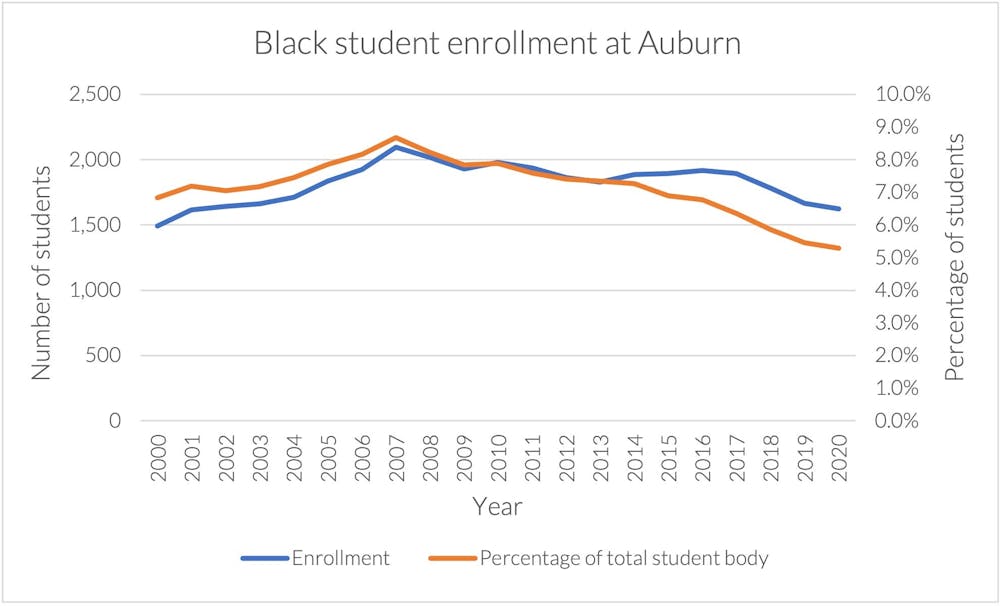Editor's Note: A sentence has been added to better provide context on a quote by Brandan Belser. We apologize to Brandan and our readers for the mistake. A statement by Cole Callahan has also been amended after he later brought it to our attention that the additional psychiatrist will be paid for from the mental health fee, not tuition.
Auburn University's Student Senate is the latest of several groups to push the University to be more open in its efforts for improving minority enrollment and making campus more equitable.
Monday, June 14, Auburn University Student Government Association held its normal senate meeting to discuss several bills, one of which was a bill proposed at the previous meeting on May 10, 2021, by Brandan Belser from the College of Liberal Arts, called a “Resolution on Auburn University Administration’s Duty to Fight Racial Inequity.”
The bill, which was unanimously passed, asked for more open and public communication between administration and faculty and students regarding the ongoing progress of diversification, such as the University's retention efforts, recruiting diverse faculty, scholarships and the renaming of buildings.
Belser read the bill, which began by mentioning the events of the past couple of years that have shed light on racial injustices in America and how Black students have brought this movement to Auburn’s campus.
Additionally, Belser’s bill pointed out the steady decline of the enrollment of Black students at Auburn over the past 10 years.
Belser also displayed data on enrollment statistics at nearby colleges and universities, comparing the percentage of Black students that make up the schools' populations, which is as follows:
Troy University: 29%
University of Alabama at Birmingham: 21%
Mississippi State University: 17%
University of Alabama: 13%
Vanderbilt University: 11%
University of Alabama at Huntsville: 9%
University of Georgia: 8%
Auburn University: 6%.
“Student feedback from Auburn University Administration’s various 2020 Listening Sessions has shown that Black students are unsatisfied with Auburn administrators’ approach to keeping the University accountable to its history and duty to the future,” the bill reads.
Furthermore, the bill mentioned an article by Inside Higher Ed in December 2020. The piece highlighted the frustrations of Black students and alumni from Auburn University, in relation to the University’s slow movement toward change in both “campus culture” and “demographic makeup.”
However, Belser acknowledged that the University has begun to take steps towards diversification. Within the application period for the class of 2025, Auburn University saw a “37% increase in minority student applications and an 18% increase in Black student applications.”
The resolution of the bill first recognized the efforts of the Black at Auburn Instagram page and Auburn Students and Community for Change. Belser then expounded upon these efforts by speaking to the Presidential Taskforce for Opportunity and Equity.
“I’m not exactly to say that they did or did not achieve a particular instance,” Belser said of the taskforce. “I am to say that I think they would have gotten to a better result had certain people been in the room, and had certain people been allowed a seat at the table.”
Belser called the bill “the general sentiment of many students.” He said, looking at the class of 2025 statistics, he sees a positive trend and hopes that the University will continue in that direction.
Three other bills from the current orders of business were adopted. These removed the student’s responsibility to request removal of academic dishonesty sanction, removed the 10-working-day minimum between date of notification and academic dishonesty hearing and amended an Aubie Try-Out spelling code correction.
Molly Boudreaux, executive vice president in outreach, and Tyler Ward, executive vice president in cabinet administration, pushed for freshman involvement, highlighting Lobby Board applications and Freshman Forum.
Later, Cole Callahan, vice president, spoke to the additional $5 fee recently tacked on to the previously standing mental health fee. Callahan explained that the purpose of this was to bring another psychiatrist to Auburn’s campus.
Finally, Michael Thomas, executive vice president in initiatives, explained that new Tiger Cards will replace students' current Tiger Cards and Ignited Cards. It will feature scanless access to events and a new way to tie in banking.
Do you like this story? The Plainsman doesn't accept money from tuition or student fees, and we don't charge a subscription fee. But you can donate to support The Plainsman.





